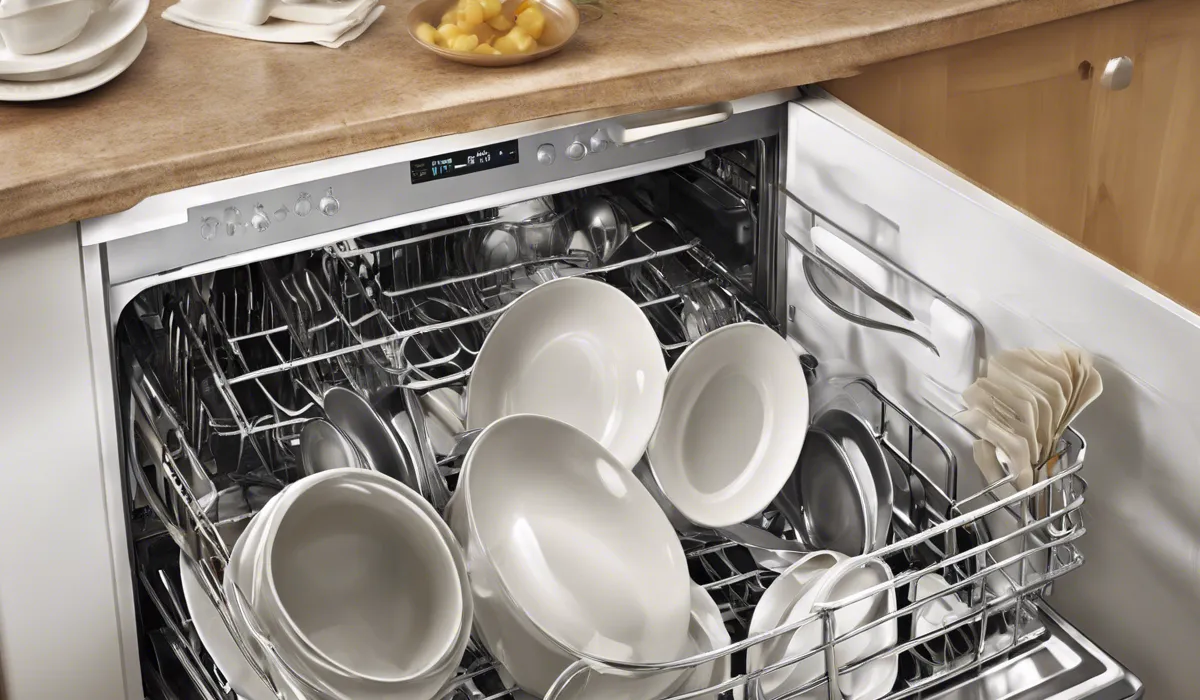How Long Can Dirty Dishes Sit in Dishwasher? The Risks!
Dirty dishes can sit in a dishwasher for 1-2 days without significant issues. Leaving them longer may cause odors and bacteria growth. For optimal hygiene, run the dishwasher within this timeframe.
Risks of Leaving Dishes in the Dishwasher Too Long

Growth of Bacteria and Mold
Leaving dishes in the dishwasher for an extended period creates a warm and damp environment that is ideal for bacteria and mold to thrive. These microorganisms can multiply quickly, leading to potential health risks.
It’s important to understand that while the dishwasher is designed to clean, it’s not a sterile environment.
Any lingering food particles can become a breeding ground for unwanted guests. To maintain a healthy kitchen, it’s best to run the dishwasher promptly.
Odor Development
Odors can begin to develop when dirty dishes sit in the dishwasher for too long. This is due to the decomposition of food remnants and the growth of bacteria.
Not only is this smell unpleasant, but it can also permeate your kitchen and surrounding areas. Running the dishwasher regularly helps to keep these odors at bay.
Attracting Pests
Pests like ants, roaches, and rodents are attracted to food remnants and can be drawn to the smell of dirty dishes in your dishwasher.
Once these pests find a food source in your home, it can be difficult to get rid of them. Frequent dishwashing helps to remove the allure for these unwanted visitors.
Potential Dishwasher Damage
When dishes are left sitting, acids and salts from food can corrode the metal and plastic components of your dishwasher.
Over time, this can lead to damage and potentially costly repairs. To protect your appliance, clear and clean it regularly, ensuring its longevity and performance.
Best Practices for Timely Dishwashing

Ideal Time to Leave Dishes in Dishwasher Post-Cycle
It is generally safe to leave dishes in the dishwasher for 1-2 days after the cycle has finished.
However, to minimize risks, aim to unload and put away clean dishes as soon as possible. This practice helps prevent the issues discussed earlier and ensures that your dishes are ready for use when you need them.
Daily vs. Weekly Dishwasher Use
Whether to use your dishwasher daily or weekly depends on the number of dishes you accumulate. For households with few dishes, running a full load once a week may be sufficient.
However, larger households or those that cook often might find a daily cycle more appropriate. The key is to avoid letting dirty dishes sit for too long before washing.
Pre-Rinsing and Scraping Food Remnants
Before loading your dishwasher, it’s a good practice to pre-rinse and scrape off food remnants from dishes. This step helps to prevent food from sticking and minimizes the risk of bacteria growth should the dishes sit for a day or two before the cycle is run.
Maintenance Tips to Prevent Odor and Bacteria Buildup
Regular maintenance, such as monthly cleaning with a dedicated dishwasher cleaner, ensures your machine remains free of odor and bacteria buildup.
Inspect and clean the filter, and use a soft brush to clean around the door seals and detergent dispensers.
Strategies for Busy Lifestyles and Prolonged Dish Storage

Scheduling Dishwashing Into Your Routine
For those with busy lifestyles, incorporating dishwashing into your daily routine can be a game-changer. Whether it’s running the dishwasher every night before bed or first thing in the morning, having a set schedule ensures dishes don’t sit for too long.
Using Rinse Aid or Dishwasher Cleaner
Utilize rinse aids to help prevent water spots and improve drying efficiency. These aids can also help control odors if dishes are to be left in the dishwasher for a day or two.
Temporary Storage Solutions for Dirty Dishes
If you can’t wash dishes right away, having a plan for temporary storage is essential.
Consider using a covered bin or adding water to the dishes to prevent food from drying out, making them easier to clean later. This also helps reduce odors and the attraction of pests.
When to Hand Wash vs. Use the Dishwasher
Hand washing may be more practical for small loads or lightly soiled items. It’s also the go-to method for delicate dishes that might not withstand the dishwasher’s intensity.
Knowing when to hand wash can help you manage dish storage effectively, especially if you can’t run the dishwasher immediately. Learn more about the best practices for hand washing dishes by exploring resources on dishwashing techniques.
While it’s acceptable for dirty dishes to sit in the dishwasher for a short period, it’s crucial to manage this time effectively to prevent issues such as bacteria growth, odors, pest attraction, and potential damage to your appliance.
FAQs About How Long Can Dirty Dishes Sit in Dishwasher
Is it okay to leave dirty dishes in the dishwasher overnight?
Yes, it’s generally okay to leave dirty dishes in the dishwasher overnight; they can sit for 1-2 days without significant issues.
What happens if I leave dishes in the dishwasher for over 2 days?
Leaving dishes in the dishwasher for over 2 days may lead to odors and bacteria growth, which is not recommended for optimal hygiene.
Can leaving dirty dishes in the dishwasher cause damage to the appliance?
No, leaving dirty dishes in the dishwasher for a short period will not typically cause damage to the appliance.
How often should I run my dishwasher to prevent bacteria growth?
To prevent bacteria growth, it is recommended to run your dishwasher within 1-2 days after loading it with dirty dishes.
What is the best way to avoid odors when leaving dishes in the dishwasher?
To avoid odors, try not to leave dirty dishes in the dishwasher beyond the recommended 1-2 day timeframe and ensure that food scraps are removed before loading.
Final Thoughts
Dirty dishes can remain in a dishwasher for up to 2 days without significant issues. However, if left longer, they may develop unpleasant odors and bacteria.
To maintain optimal hygiene, it’s best to run the dishwasher within the 1-2 day window after loading.




